Have you ever wondered why some men form deep, unshakable bonds while others seem cold, distant or even detached? The answer isn’t just about feelings, it’s about biology. Love, especially for men, is more than an emotion; it’s a carefully orchestrated symphony of hormones and brain chemistry.
While poets and rom-coms paint love as purely emotional, science tells a more fascinating story. Hormones like vasopressin, dopamine, and oxytocin are the real stars of the show, shaping male bonding, loyalty, and the process of falling in love. Understanding how these “love chemicals” work can change everything you know about relationships.
What Makes This Page Different?
This isn’t just another article filled with clichés about love. It’s your ultimate guide to how men fall in love, blending cutting-edge science with practical, real-world advice. Whether you’re trying to understand your partner better, deepen an emotional connection, or satisfy your curiosity, you’re in the right place.
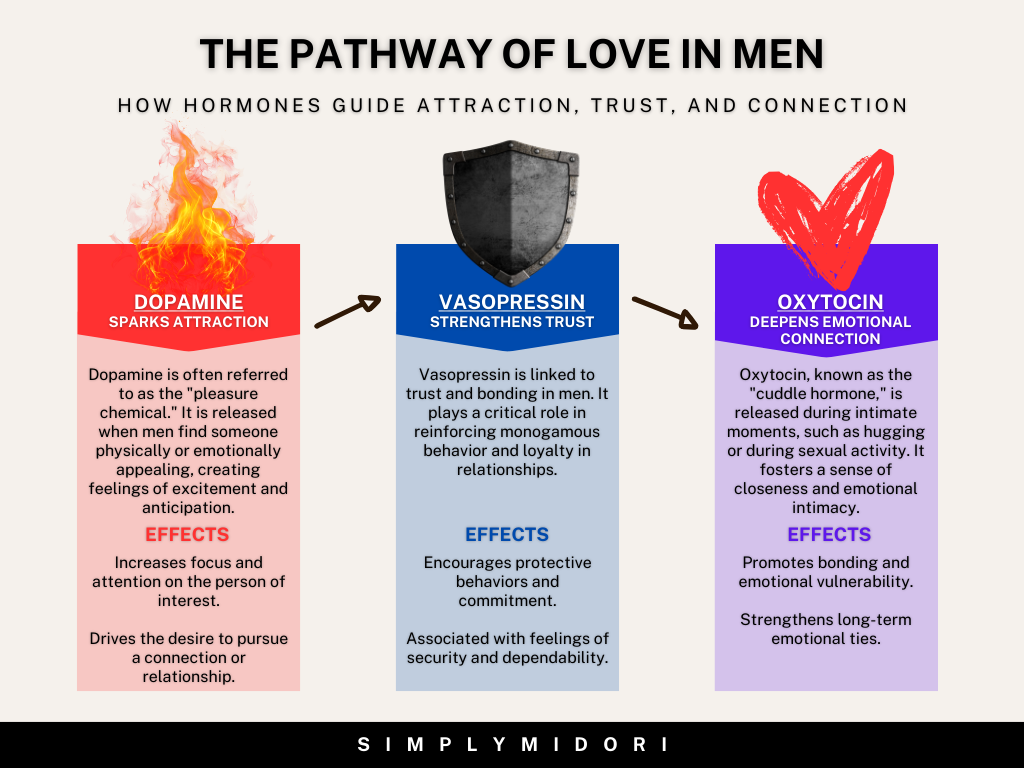
Here’s What You’ll Learn
- The Science of Love: What really happens in a man’s brain during attraction, bonding, and attachment.
- The Hormones of Bonding: Why vasopressin is called the “bonding hormone” and how it works alongside dopamine and oxytocin to create lasting emotional connections.
- Practical, Real-Life Tips: Proven ways to naturally trigger vasopressin and build deeper bonds in your relationships.
Why This Knowledge Changes Everything
When you understand how men fall in love on a biological and psychological level, you gain tools to:
- Build stronger, more meaningful relationships.
- Recognize the signs of true emotional attachment.
- Avoid common pitfalls that undermine connection.
Think of this page as your roadmap to navigating relationships with clarity and confidence, rooted in science but designed for real life.
Did you know? Vasopressin, known as the bonding hormone, increases loyalty and trust in men by over 50% during attachment phases.
Dr. Andrew Huberman
FAQs About Men Falling in Love
In a hurry? Below, we’ve gathered the most common queries about how men fall in love, the role of hormones like vasopressin, and how emotional bonds are formed. These quick answers are here to save you time. If you’re curious for more details, dive into the in-depth sections linked in the table of contents or throughout the article.
Q: What hormones make men fall in love?
- Dopamine: Triggers attraction and creates feelings of euphoria and excitement during the early stages of love.
- Vasopressin: Reinforces loyalty and bonding, playing a key role in long-term attachment.
- Oxytocin: Enhances emotional intimacy and trust, especially during physical touch and shared experiences.
- Testosterone: Fuels desire and the initial drive to pursue a partner.
Q: How does vasopressin bond men emotionally?
- Vasopressin promotes feelings of protection, loyalty, and emotional connection.
- It activates the brain’s reward system, making men associate their partner with positive experiences.
- Vasopressin release is triggered by intimacy, trust-building activities, and shared challenges.
Q: Can you trigger vasopressin over text?
- While physical touch and shared experiences are the most effective triggers, emotional connection through words can help.
- Examples:
- Share meaningful compliments: “I feel so lucky to have you in my life.”
- Express gratitude: “I really appreciate how supportive you’ve been lately.”
- Build anticipation for an activity together: “I can’t wait for our adventure this weekend, it’s going to be amazing!”
Q: When do men release vasopressin?
- During moments of physical intimacy, such as hugging, cuddling, or during sex.
- When participating in activities requiring teamwork or problem-solving.
- During stress, particularly when navigating challenges with a trusted partner.
Q: Does stress make men fall in love?
- Short-term stress: Can boost vasopressin release, creating stronger bonds when couples face challenges together.
- Chronic stress: Suppresses bonding hormones like vasopressin, making it harder to connect emotionally.
Q: Does having sex too soon affect long-term bonding?
- Sex triggers vasopressin and oxytocin, which can create emotional bonds.
- However, if emotional intimacy isn’t developed alongside physical intimacy, the relationship may feel unbalanced over time.
Q: How can I increase vasopressin bonding in my relationship?
- Focus on shared experiences like trying new activities or solving challenges together.
- Build trust through consistent communication and follow-through on commitments.
- Incorporate regular physical touch, like hugs, holding hands, or cuddling.
Q: Why do men fall in love differently from women?
- Men rely more on vasopressin for bonding, while women depend more on oxytocin.
- Men tend to bond through shared activities and physical proximity, whereas women often prioritize emotional intimacy and communication.
The Science of Romantic Love: What Happens in a Man’s Brain?
Falling in love feels magical, but behind that magic lies a fascinating biological process. For men, love is not just a matter of the heart, it’s a symphony of hormones and brain chemistry working together to create feelings of attachment, loyalty, and trust. To truly understand how men fall in love, we need to dive into the science of dopamine, vasopressin, and oxytocin, the hormones that make love happen.
When a man feels attracted to someone, his brain triggers a chain reaction of chemicals designed to create connection and attachment. Here’s how it works:
Dopamine: The Spark of Attraction
Dopamine the “pleasure chemical” is released when you experience something enjoyable, like eating your favorite food, winning a game or seeing an attractive person. Think of dopamine as the brain’s way of saying, “I like this, let’s do more of it.” Example: That rush of excitement on a first date when everything feels perfect? That’s dopamine lighting up reward pathways in the brain.
Vasopressin: The Bonding Hormone
Once dopamine initiates attraction, vasopressin steps in to solidify the connection. Often called the “bonding hormone,” vasopressin plays a key role in creating loyalty and long-term attachment in men. Example: The desire to protect and care for someone over time often stems from vasopressin’s influence.
Oxytocin: The Glue of Emotional Intimacy
Known as the “cuddle hormone,” oxytocin enhances feelings of trust and emotional closeness, especially during physical touch or shared vulnerable moments. Example: A warm hug or a heart-to-heart conversation triggers oxytocin, strengthening emotional bonds.
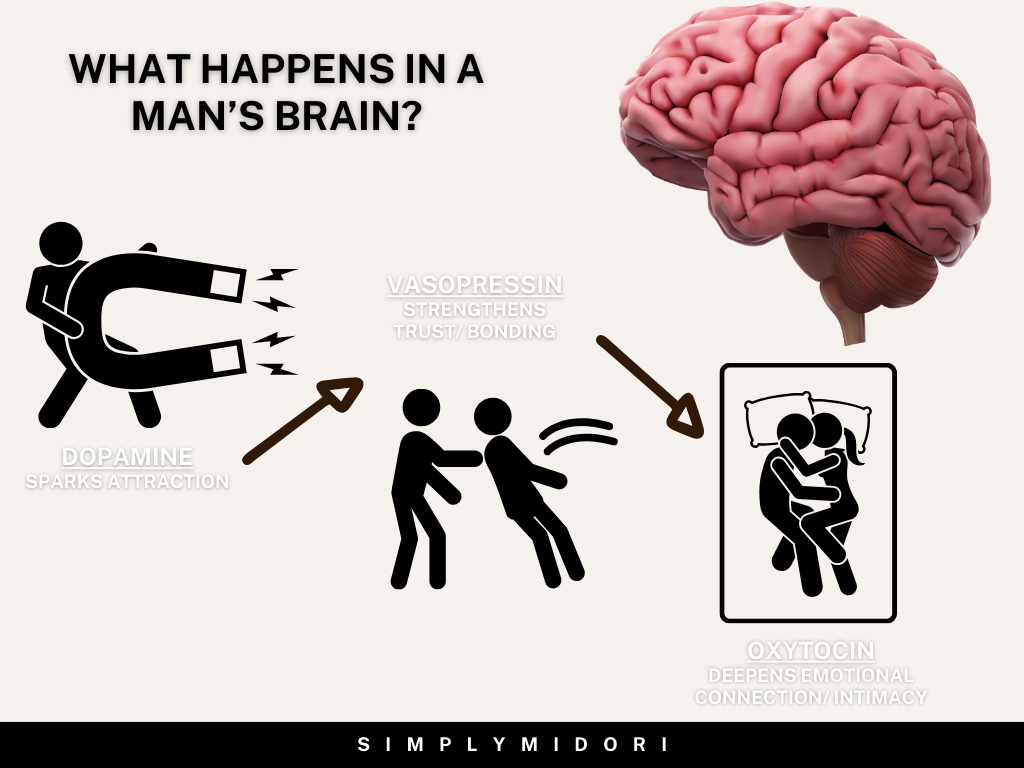
Why Vasopressin Matters in Love?
Vasopressin holds a special role in male bonding. While dopamine excites and oxytocin connects, vasopressin is the glue that keeps men loyal and invested. Here’s why it matters:
It Builds Trust and Loyalty
Vasopressin affects behaviors associated with trust and protection, particularly in romantic relationships. It fosters a deep sense of responsibility and commitment to the person they love. Keyword opportunity: “Men fall in love with vasopressin.”
It Triggers Protective Instincts
This hormone is also linked to territorial and protective behaviors, often seen in men who feel deeply connected to their partner. Relatable example: The instinct to “be there” for a partner during tough times is often rooted in vasopressin’s effect on the brain.
It Encourages Long-Term Bonding
Vasopressin doesn’t just help men fall in love; it keeps them emotionally invested in the relationship over time, reinforcing a sense of “we’re in this together.”
Vasopressin is the hormone of loyalty, helping men build and maintain deep emotional connections.
What Are the Stages of Love?
Love often feels like a whirlwind, but beneath the surface, it follows a clear biological progression. For men, falling in love involves three distinct stages: Lust, Attraction, and Attachment. Each stage is governed by specific hormones that drive emotions, behaviors, and connections.
Lust, Attraction, and Attachment: The Three Stages
Understanding these stages can demystify how men fall in love and help us recognize what’s happening beneath the surface.
Lust: The Initial Spark
What It Is: Lust is driven by physical attraction and fueled by hormones like testosterone and estrogen in women.. This stage is all about reproduction and the primal desire to connect physically. It coerces us to engage in sexual behavior for sexual gratification. Lust enables us to find potential mating partners. To be clear, lust is not love and should not be mistaken for it. We can lust for someone we love, but we can also lust and have sex with someone we do not love.
Key Hormone: Testosterone, responsible for increasing libido and the initial drive to pursue a partner.
Relatable Example: The first glance across the room or that magnetic pull toward someone’s smile? Your heart races, your palms sweat, and you get all those butterflies in your stomach. That’s lust doing its job.
Fun Fact: Men have higher levels of testosterone than women, which often makes the lust stage more pronounced for them.
Attraction: The Emotional High
Once we move on from strictly engaging with said person(s) that peaks our sexual arousal, we move on to the next phase, where men fall in love.
What It Is: Attraction is where emotions intensify, and men start to obsessively think about and focus one one person craving their company and their attention. This stage is often described as the “honeymoon phase,” with a rush of energy and excitement.
Key Hormones:
Dopamine: Creates feelings of reward and pleasure, making time with a partner feel irresistible.
Norepinephrine: Heightens focus and excitement, giving that “butterflies in the stomach” sensation.
Serotonin: Drops leading to intrusive thoughts (constantly thinking about them) and creates calm, trust and the long-term connection.
Relatable Example: This is when we stay up all night texting each other or obsessing over a our partner’s quirks, smile etc.
The Science: During this phase, dopamine floods the brain’s reward system, making interactions with the person feel euphoric and addictive. Scientists liken this stage to obsession because the brain’s reward center activates, which has powerful effects on our emotions, thoughts, and behavior. This stage usually lasts between six months and two years.
Note a woman can fall in love at the 1st stage. However, it is here that a man falls in love as his oxytocin receptor starts to respond to you.
Attachment: Building a Life Together
This stage is vital to the success of long term relationships. Attachment, a more transparent form of love, affects us differently than the attraction stage. After about two years of being in a relationship, dopamine, and attraction decrease, and if things go well, dopamine gets replaced by two hormones: oxytocin and vasopressin. These chemicals create the desire to bond with your partner and nurture them.
If the stage above is where men fall in love, this is the stage where man decides he wants to be with you across his life span. This stage marks that you’ve built a foundation of trust, respect, and mutual understanding.
What It Is: Attachment is the long-term bond that forms between partners, fostering stability, trust, and deep emotional intimacy. You feel a deep emotional connection and know that this person is the one for you. Attachment enables couples to stay together to raise children, develop a deep bond, grow old together, and feel content. For some, it is at this stage that they find their sexual arousal diminishes, causing us to see the fundamental sex differences with our romantic partners.
Key Hormones:
Vasopressin: Promotes loyalty and protective instincts.
Oxytocin: Enhances trust and emotional bonding, especially during physical touch.
Relatable Example: A couple who shares routines, leans on each other in tough times, and feels emotionally safe is experiencing the attachment stage.
The Science: Vasopressin is particularly significant for men, reinforcing loyalty and a sense of responsibility toward their partner.
Do Men and Women Fall in Love Differently?
While men and women both experience the same stages of love, the way their hormones drive these stages differs significantly.
The Difference Between Vasopressin vs. Oxytocin
Men: Vasopressin is the dominant hormone in male bonding. It’s linked to territoriality and protective behaviors, making men more likely to prioritize loyalty and long-term commitment.
Women: For women oxytocin is what enhances feelings of trust and nurturing behaviors. Women often bond more deeply through emotional intimacy and physical touch (non-sexual).
What Role Does Stress Play in Male Bonding?
Men are more likely to form bonds in stressful situations, as vasopressin levels rise under pressure. This is why shared challenges or problem-solving can create deeper connections. Relatable Example: Think of a couple working through a crisis together, the stress often strengthens the relationship rather than weakening it.
Emotional vs. Physical Triggers
- Men are often biologically primed to bond through shared experiences and physical proximity.
- Women tend to bond more deeply through emotional sharing and communication.
- Relatable Example: A man may feel closer after a day of shared activities, while a woman may feel closer after a meaningful conversation.
At what stage do men and women fall in love?
Most men fall in love beginning at stage 2 (attraction) and progress to stage 3 (attachment). But lust creates a space for couples to meet and eventually form a bond, which can lead to the pair bonding, and then you both fall in love. Sometimes, couples can skip stage 2 to stage 3, such as in arranged marriages (although these couples skip vital steps, they can still fall in love). Understanding these three stages of love can help you navigate your relationships and better understand your emotions. These three stages above apply to both sexes. The differences are strictly on a biological level.
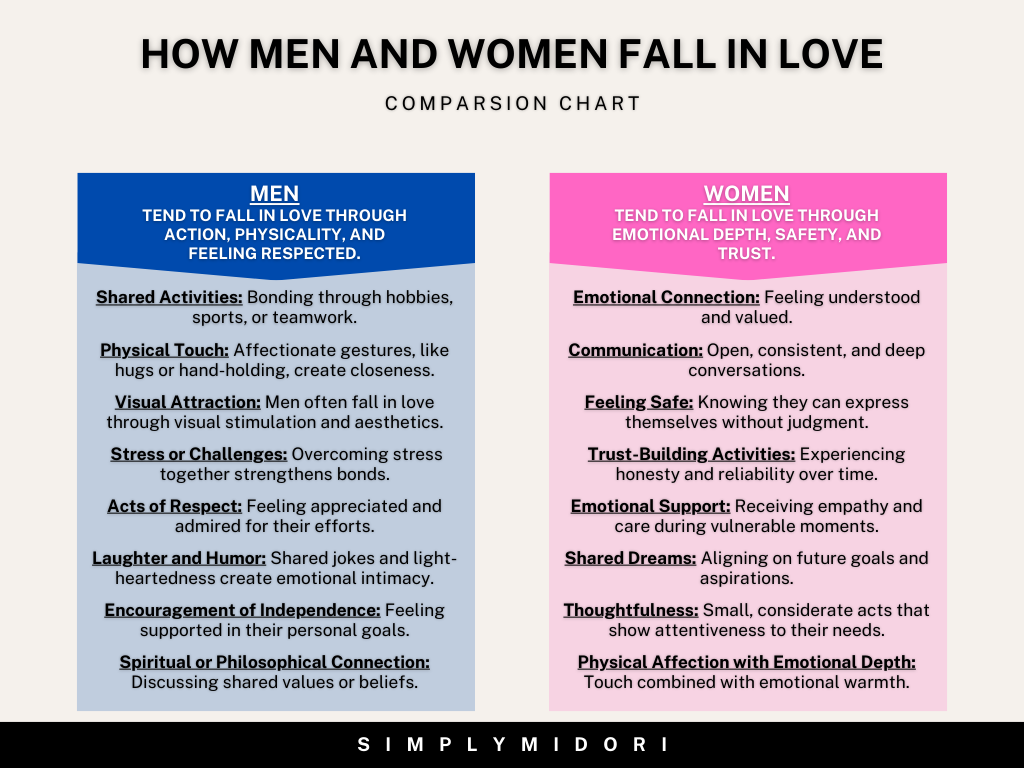
How to Foster Love in Each Stage?
Lust: Focus on maintaining attraction by keeping the “spark alive” dress up, smell good, surprise each other
Attraction: Plan exciting activities to keep dopamine levels high and the relationship feeling fresh.
Attachment: Build trust through consistent actions, meaningful conversations, and shared rituals.
Unlocking the Chemistry of Love in Men
Two hormones, vasopressin and dopamine, along with testosterone, play pivotal roles in how men bond, develop trust, and commit to long-term relationships. Understanding how these hormones interact provides valuable insight into male bonding and love.
How Does Vasopressin Shape Male Bonding?
Vasopressin is often called the “bonding hormone” for good reason. It plays a critical role in forming and maintaining emotional connections in men. Here’s how:
Promotes Loyalty and Long-Term Commitment
Vasopressin influences the brain’s reward system, encouraging behaviors like loyalty and protection. This hormone ensures that a man feels invested in his partner, fostering a sense of stability in the relationship.
Example: A man who takes on responsibilities to support his partner or prioritizes their relationship over distractions is likely experiencing the effects of vasopressin.
Strengthens Emotional Bonds
Vasopressin enhances feelings of attachment and reduces fear and anxiety in relationships, creating a safe emotional environment for both partners.
Example: When men feel protective or deeply connected after solving a problem together, that’s vasopressin at work.
Fosters Protective Instincts
Vasopressin triggers a natural desire to protect and care for one’s partner, which often translates into small but meaningful actions that build trust over time.
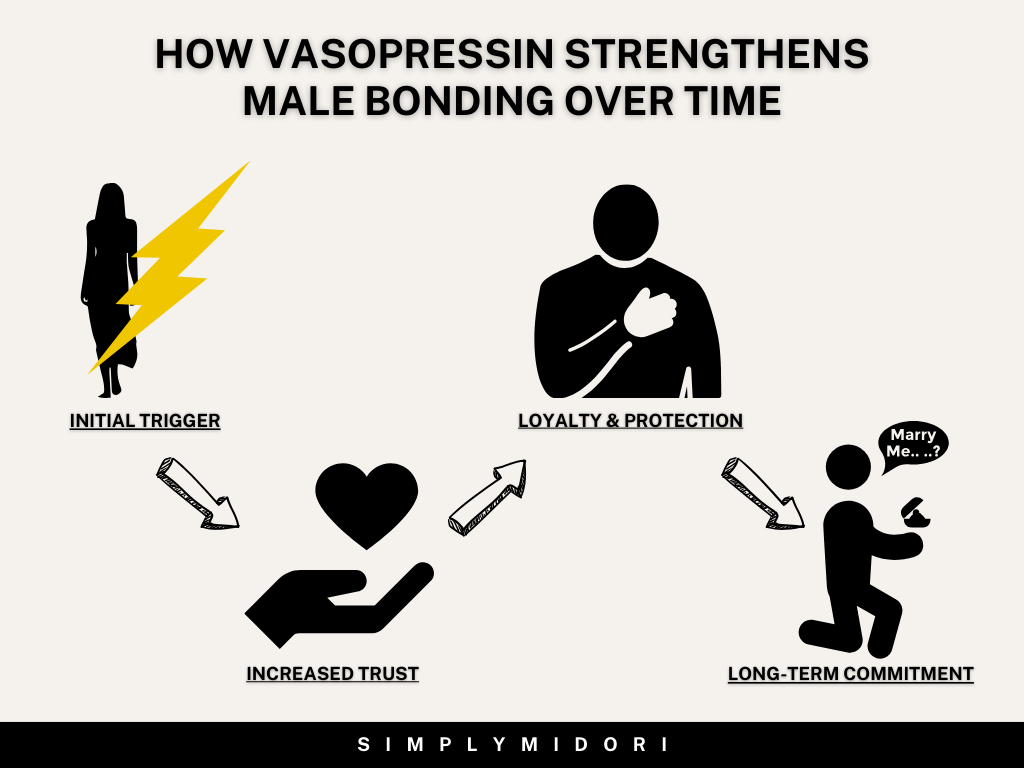
How to Release Vasopressin in a Man Naturally
The good news is that increasing vasopressin levels doesn’t require complicated rituals, it’s about fostering the right experiences. Here are some natural ways to trigger this bonding hormone:
Physical Touch
Simple acts like hugging, holding hands, or cuddling stimulate vasopressin release, creating a sense of safety and connection. Practical Tip: Try starting your day with a hug or ending it by holding hands while sharing about your day.
Shared Experiences
Engaging in activities that require teamwork or shared effort—like hiking, cooking together, or solving a puzzle—can naturally boost vasopressin. Example: A couple that builds a piece of furniture together isn’t just decorating their home; they’re also strengthening their bond.
Trust-Building Moments
Acts of trust, such as relying on one another during difficult times or sharing personal vulnerabilities, are powerful triggers for vasopressin. Example: Opening up about a challenging life experience can create deeper emotional bonds.
The Impact of Dopamine and Testosterone
While vasopressin is critical for long-term bonding, dopamine and testosterone lay the groundwork for attraction and initial interest.
Dopamine: The Thrill of the Chase
Dopamine creates the feeling of euphoria and reward during the attraction phase, making every interaction feel exciting and meaningful.
Example: That “can’t stop smiling” feeling after a successful date? That’s dopamine lighting up the brain’s reward pathways.
How It Relates to Vasopressin: Dopamine drives the initial interest, while vasopressin cements emotional commitment over time.
Testosterone: Energy and Drive
Testosterone fuels the physical and emotional drive to pursue a romantic partner, amplifying confidence and focus during the early stages of attraction. Over time, as testosterone stabilizes, vasopressin and oxytocin take over to maintain emotional connection.
Example: A man who goes out of his way to impress his partner or makes bold gestures is likely under the influence of testosterone.
The Balance of Hormones
Dopamine excites, testosterone energizes, and vasopressin stabilizes, together, they create the chemistry of love.
Practical Takeaways
Focus on shared activities and trust-building moments to naturally increase vasopressin levels.
Keep the relationship exciting by engaging in new experiences that boost dopamine.
Understand that testosterone plays a role in the initial attraction, but deeper bonding relies on vasopressin and emotional connection.
Do Men Fall in Love Through Sex?
It’s a tale as old as time: people fall in love with their conquests in the bedroom. But is it true? According to Dawn Maslar, sex psychologist, it’s not that simple. We know that sex releases bonding chemicals oxytocin and vasopressin and vasopressin helps a man fall in love with you.
BUT! Men experience a surge of dopamine and vasopressin when dating a woman and enjoying their time together, but their vasopressin levels drop after sex. While both sexes may enjoy the act, it doesn’t mean they will fall head over heels for their romantic partners.
On the other hand, women experience a gradual increase in dopamine and oxytocin when they’re dating someone they’re interested in. And when they orgasm? Their oxytocin levels skyrocket.
But what does this mean for the early stages of dating?
The Connection Between Sex and Bonding
Sex plays a significant role in triggering vasopressin, which strengthens emotional bonds and deepens trust in relationships. Here’s how:
How Vasopressin Works During Sex
- During intimacy, men experience a surge in vasopressin. This hormone acts as a signal to the brain, reinforcing attachment and loyalty to their partner.
- Vasopressin’s effects are particularly potent when combined with oxytocin, which is also released during physical touch and climax. Together, these hormones enhance feelings of closeness and connection.
- Relatable Example: A man might feel a stronger desire to protect and care for his partner after being intimate, even if he doesn’t consciously connect it to a biological process.
Why Sex Can Trigger Emotional Bonding
- For men, sex is often linked to trust-building and emotional vulnerability. When vasopressin is released, it encourages a sense of emotional safety and long-term commitment.
- Science Insight: Studies have shown that vasopressin reinforces pair-bonding behaviors, particularly in men, by activating the reward centers of the brain.
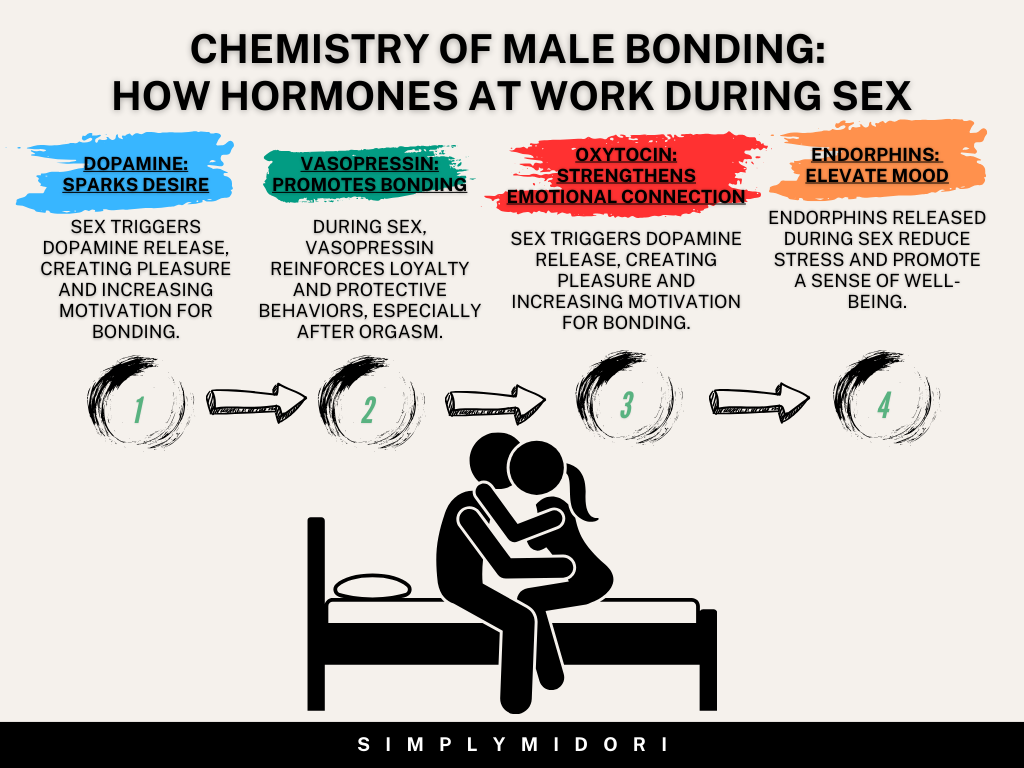
Does Sex Too Soon Reduce Long-Term Interest?
Picture this: you’ve just met someone new, and the chemistry is off the charts. You can’t keep your hands off each other, and the sex is mind-blowing. But then, after a few weeks or months, something strange happens. You notice he feels less interested in you, barely calls or texts, and you can’t figure out why.
Enter the Coolidge Effect. Coolidge performed one study where he observed humans and animals to try and understand the biological phenomenon of why sex too quickly in a relationship can sometimes lead to less interest over time.
He discovered that the more you mate with the same partner, the less interested you become. But throw a new partner into the mix, and your sexual desire reignites.
So, what’s going on here?
According to Dawn Maslar, when you first start dating someone and the sexual chemistry is intense, hormones flow wildly. However, when you satiate sexually too quickly, dopamine and vasopressin drop rapidly, causing the guy to lose interest in you.
So, what can you do to combat the Coolidge Effect?
One solution is to focus on emotional and physical intimacy, while meeting his core needs. Make time to connect with your partner on a deeper level through meaningful conversations and shared experiences. Another solution is to mix things up in the bedroom. Try new positions, toys, or role-playing scenarios to keep things fresh and exciting.
Ultimately, the Coolidge Effect is just one of many factors that can impact your sexual desire and relationship satisfaction. But by understanding this phenomenon, you can take steps to keep the spark alive and avoid falling into a rut.
Science Reveals: Commitment Lowers Testosterone
According to studies, men in committed romantic relationships have 21% lower testosterone levels than their single counterparts.
When a man commits to a relationship, his testosterone levels drop, allowing the bonding hormone oxytocin to take over. So, it’s not just that romantic dinner or a long walk on the beach making romantic partners feel closer – it’s oxytocin levels increasing!
Interestingly, marriage isn’t the only factor that determines lower testosterone levels. Both married and unmarried men can experience the same effects if they’re in a committed relationship.
But wait, don’t assume his sex drive will plummet once he is in a committed relationship. While his testosterone may lower, it doesn’t necessarily mean he will experience a diminished libido. Just remember to focus on your partner and not other women. Note that dreaming or fanaticizing about other women may boost his testosterone levels, but it may not necessarily heighten his desire for the woman he is committed to.
The Role of Timing in Emotional Bonding
Jumping into a sexual relationship too quickly can sometimes short-circuit the natural progression of emotional intimacy. While the physical bond might form, the emotional foundation may not have time to develop.
The Science of Delayed Gratification
Delaying sexual intimacy allows the brain’s reward system, driven by dopamine and vasopressin, to associate bonding with shared experiences rather than just physical pleasure. This can strengthen the relationship’s foundation.
Practical Tip: Focusing on communication, shared goals, and trust-building activities before becoming physically intimate can enhance long-term compatibility.
Does Early Sex Diminish Long-Term Interest?
While it doesn’t necessarily reduce long-term potential, having sex too early can create an imbalance where physical intimacy overshadows emotional connection.
Science Insight: Men are more likely to associate long-term commitment with relationships that include trust and vulnerability alongside physical attraction.
Practical Takeaways
Focus on Emotional Connection: Building trust and emotional intimacy before physical intimacy can strengthen long-term bonds.
Use Physical Touch Wisely: While sex can trigger vasopressin release, smaller acts of touch, like holding hands or hugging, can also deepen bonds without rushing intimacy.
Communicate Expectations: Honest conversations about relationship goals can align emotional and physical priorities for both partners.
Common Barriers to Love and Bonding
Love may feel natural, but barriers like stress and emotional blocks can disrupt the process of bonding. For men, hormones like cortisol (the stress hormone) can interfere with the release of vasopressin, the hormone responsible for loyalty and attachment. Understanding these obstacles and how to overcome them is key to building deeper connections.
Why Stress and Fear Can Sabotage Love
Stress is often a silent enemy of love, affecting a man’s ability to bond emotionally. Here’s how it works:
Cortisol vs. Vasopressin
Cortisol is the body’s go to stress hormone, which suppresses the production and effects of vasopressin. When stress levels are high, the body prioritizes survival over bonding, making it almost impossible for men to feel connected or emotionally present.
Example: When a man is dealing with chronic work, family or financial stress he will struggle to show affection or maintain emotional intimacy, even if he deeply cares for his partner.
The Role of Fear in Emotional Withdrawal
Fear, whether of rejection, vulnerability, or failure, can trigger a stress response that leads men to withdraw emotionally. This avoidance behavior further disrupts the bonding process.
Example: A man who has experienced past heartbreak might instinctively avoid emotional closeness, fearing a repeat of that pain.
Can Stress Make Men Fall in Love?
While chronic stress is damaging, short-term stress can have the opposite effect. Shared stressful experiences, like solving a problem together or navigating a crisis, can increase vasopressin levels and deepen bonds.
Relatable Example: A couple who works through a financial challenge together may come out stronger because of the vasopressin released during their teamwork.
Overcoming Emotional Blocks
Even when stress or fear creates barriers, there are tools and techniques to help men feel safe and open to bonding. Here are practical strategies:
- Mindfulness Practices
- Encourage mindfulness exercises like deep breathing or meditation to lower cortisol levels and create emotional space for connection.
- Practical Tip: Start with a 5-minute mindfulness session together to create a sense of calm and presence.
- Shared Relaxation Activities
- Activities like yoga, walking in nature, or listening to calming music together can reduce stress and encourage the release of vasopressin.
- Example: A couple who takes evening walks together may feel closer due to the shared experience and reduced stress levels.
- Open Communication About Stress
- Talking about fears or stressors in a safe, nonjudgmental environment can help men process their emotions and feel more connected.
- Practical Tip: Ask open-ended questions like, “What’s been on your mind lately?” to encourage openness.
- Building Emotional Safety
- Create a relationship environment where mistakes or vulnerabilities are met with compassion rather than criticism. This reduces fear and encourages deeper bonding.
- Practical Tip: Acknowledge your partner’s feelings versus always trying to understand them. Acknowledgement shows empathy and reduces stress.
Practical Takeaways
- Use mindfulness and shared relaxation activities to reduce cortisol levels and foster emotional safety.
- Recognize that fear or past pain can create barriers, but open communication and trust can break them down.
- Transform stress into an opportunity to bond by facing challenges together with empathy and teamwork.
What Are Practical Ways to Trigger Vasopressin?
Creating a meaningful and lasting emotional connection with a man isn’t just about grand gestures or perfect timing—it’s about fostering trust, intimacy, and the release of bonding hormones like vasopressin. Here are practical ways to strengthen emotional bonds and build a foundation for long-term connection.
Vasopressin levels increase naturally in response to various stimuli. To help boost vasopressin levels, try spending quality time together, sharing experiences, and providing support, all triggering high levels of arginine vasopressin to release. Below, we compiled specific ideas that make a man fall in love:
1. Participates In What He Likes
Hence, get to know what he likes (sports watching or playing, business etc.) and know that man fall for a woman they can do activities with.
2. Physical Attraction
Man fall for a woman that others desire. Hence if a woman maintains her physical fitness and appearance, she will keep his sexual attraction and desire focused on her!
3. Admiration
When a woman constantly appreciates and respects him while avoiding criticism, you create a positive emotional connection and trigger high levels of vasopressin to release.
4. Encourage Physical Touch
Initiate affectionate gestures; try to include things like spontaneous hugs, gentle touches, or playful kisses, as they all stimulate high levels of vasopressin in men.
5. Engage in Novel Activities Together
Spending time trying new activities or experiences together can create excitement and novelty in the relationship. Engaging in activities that require teamwork or problem-solving, like tackling a DIY project or training for a fitness goal together, boosts vasopressin. Remember man fall for a woman they can try new things with.
6. Take Care of His Needs
Use your maternal behavior (nurturing instincts) and help take care of him (no, don’t become his mom). Try cooking his favorite meals, offering him time to relax, helping lighten his load by doing things that add stress to him. A man falls for a woman that can help him!
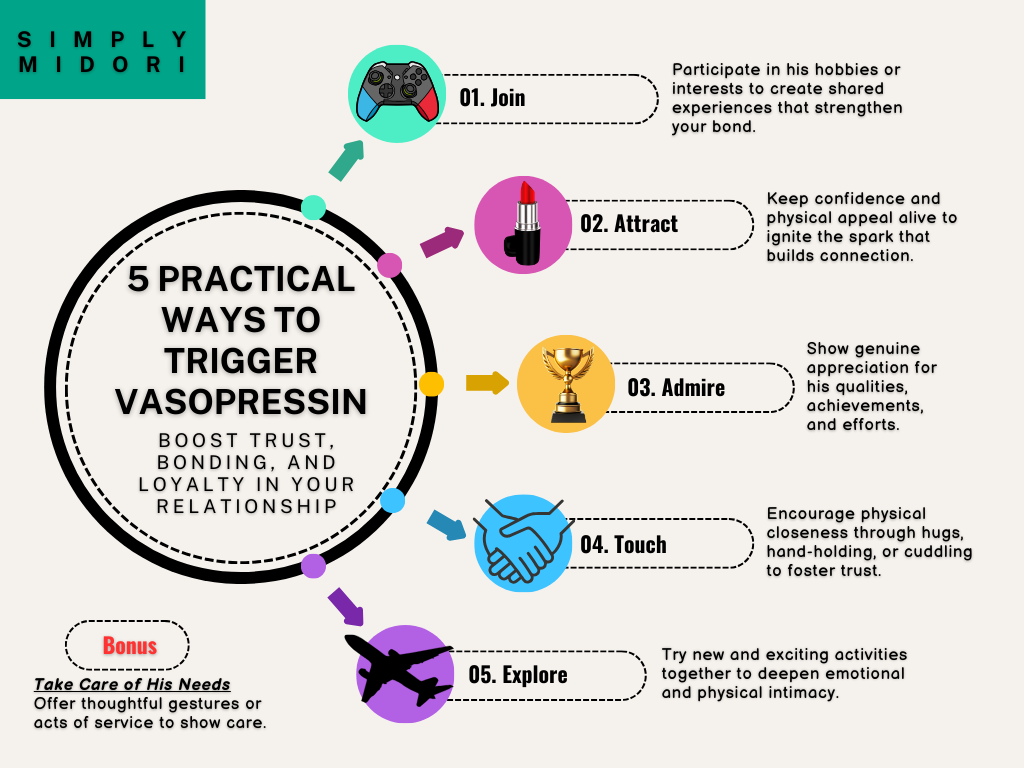
How To Build Trust and Emotional Intimacy
True emotional connection is rooted in trust and vulnerability. Here are key steps to foster deeper intimacy in your relationship:
Be Consistent in Your Actions
Trust is built through consistency. Hence follow through on promises, keep your word, show up when needed, and create a sense of reliability.
Example: If you promise to do or support him during a difficult time, ensure your actions align with your words.
Practice Active Listening
Emotional intimacy grows when both partners feel heard and understood. Focus on listening without judgment or interruption to show genuine care.
Example: Reflect back what he shares with statements like, “It sounds like that was really important to you,” to validate his feelings.
Create a Safe Space for Vulnerability
Encourage him to share his fears, insecurities, or emotions by being nonjudgmental and supportive. Vulnerability strengthens emotional bonds.
Example: Share your own vulnerabilities and secrets to set the tone, you know the things that you haven’t told anyone.
Celebrate Small Wins Together
Acknowledge and celebrate achievements, both big and small, to build mutual appreciation and deepen connection.
Example: Whether it’s completing a tough project or achieving a personal goal, celebrating together reinforces partnership.
Trust and vulnerability are the cornerstones of emotional intimacy.
Practical Takeaways
Invest in Shared Experiences: Build connection through teamwork; solving challenges or problems together or doing/creating something meaningful together.
Focus on Physical Touch: Small, consistent acts of affection foster safety and attachment.
Encourage Open Communication: Deepen intimacy by actively listening and creating a safe space for vulnerability.
Conclusion
Falling in love might seem like a mystery, but science reveals that it’s more about basic biology. For men these three hormones: vasopressin, dopamine, and oxytocin play key roles when wanting to form a deep emotional bond with a man. Remember:
- Dopamine sparks the intial attraction and excitement
- Vasopressin strengthens loyalty and bonding
- Oxytocin enhances emotional intimacy and trus
These hormones shape emotions and actions, understanding them is simply empowering! This knowledge allows us to navigate relationships with greater confidence and clarity. Whether you’re looking to strengthen a current relationship or looking to create a new bond, the knowledge here will help you build the connection you want.











